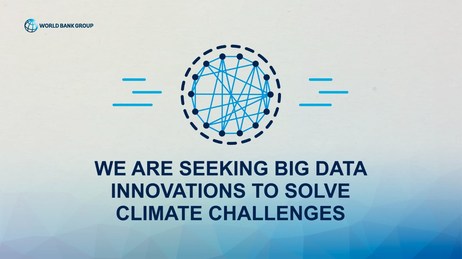Leveraging Open Innovation for Climate Resilience
Published Jul-03-17Breakthrough:
An innovative use of big data to predict crop yield, helping to address food security challenges and reduce the impact of climate change.
Company:
World Bank, United States
The Story:
 Innovations are vital for addressing one of the most pressing issues of our time: climate change and its impact on life on this planet. At the same time, there is a big data revolution sweeping the globe.
Innovations are vital for addressing one of the most pressing issues of our time: climate change and its impact on life on this planet. At the same time, there is a big data revolution sweeping the globe. A constant data stream flows from companies, corporations, phones, the infrastructure of cities, healthcare establishments and more. And while the quantity is staggering it's what can be done with the data that is truly impressive.
Novel ways of looking, linking and using data not only generate fresh insights, but they are also underpinning new waves of innovation.
With climate change predicted to lead to more extreme weather events that will hit the poorest hardest, the World Bank decided to leverage the diverse smarts of a global audience of innovators by launching the Big Data Innovation Challenge in October 2016.
It was a call to innovate with big data, to come up with ideas and solutions to improve climate resilience by addressing food security, nutrition, forests and watersheds.
A total of 189 submissions were received from start-ups, students, non-profits, entrepreneurs and others from 45 countries. They went through several rounds of evaluation, scrutinized by a panel of almost 40 judges that included data scientists and climate change specialists.
Winners Selected
For the winner of the Food Security category, the panel selected the Stanford Sustain team for a concept that predicts crop yield several months before harvest. Their approach combines readily available satellite imagery with machine learning. "We believe our Crop Yield Mapping solution will help farmers, organizations and governments make better crop related decisions around planting and food security," said team member Jiaxuan You.
The winner of the Forests and Watersheds category was awarded to a team called Water Cloud for a cloud-based platform to support water resource planning. The team claim that current water resource planning technologies are few in number, slow to deliver value and require specialized expertise. "Through Water Cloud we want to make sophisticated water modeling more accessible and valuable to Policy Makers," commented team member Amit Parashar.
Among the open innovation challenge's finalists were:
1) An online collaboration platform for citizens, engineers, government organizations and others to develop coordinated and sustainable solutions to challenges faced by flood hit cities.
2) The use of artificial intelligence to estimate banana productivity by analyzing weather and climate information. Among the benefits of this approach are helping local farmers make smarter investments and allowing them to take early action in the face of natural disasters.
What Happened Next?
The winning ideas were each awarded $10,000 USD and their solutions were incorporated into the World Bank Group's plans to address real-world climate challenges, helping it to fulfill the UN's 17 Sustainable Development Goals. Among them are taking urgent action to combat climate change, ending poverty everywhere and ensuring clean water and sanitation for all.
Next Story »


